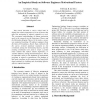Free Online Productivity Tools
i2Speak
i2Symbol
i2OCR
iTex2Img
iWeb2Print
iWeb2Shot
i2Type
iPdf2Split
iPdf2Merge
i2Bopomofo
i2Arabic
i2Style
i2Image
i2PDF
iLatex2Rtf
Sci2ools
104
click to vote
ESEM
2009
ACM
2009
ACM
An empirical study on software engineers motivational factors
This article describes a survey which aims to identify the relative importance of a set of factors that affect the motivation of software engineers at work. The conceptual underpinnings of human motivation used in the research are the Expectancy Theory and the Motivation-Hygiene Theory. In the study, a survey was conducted involving 176 software engineers from the State of Pernambuco, Brazil. Data collected with the survey received statistical treatment to test correlation among the motivational factors, and the existing correlations were used to create a partial order relation that reflects relative importance, or systemic influence, among motivational factors. This is an important result for the definition of motivational programs in software organizations. The findings of this study contribute to the construction of empirically based methods for building and developing effective software engineering teams.
ESEM 2009 | Motivational Factors | Relative Importance | Software Engineering | Software Engineers |
Related Content
| Added | 28 May 2010 |
| Updated | 28 May 2010 |
| Type | Conference |
| Year | 2009 |
| Where | ESEM |
| Authors | A. Cesar C. Franca, Fabio Q. B. da Silva |
Comments (0)

